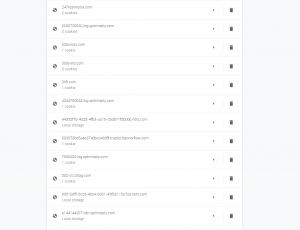Last week, we busted some common myths regarding web cookies, as well as their importance to online advertising when it comes to making conversions. In particular, we discussed their importance for targeting and retargeting your ads.
There’s just one problem: cookies might be on their way out!
Cookies have formed the bedrock of digital advertising strategies for almost as long as digital advertising has existed. Whether it’s Google AdWords or any other third-party advertiser, cookies allow you to improve your customer experience and land more conversions through targeted advertising.

While writing that post however, I saw a lot of discussion revolving around the future of cookies… namely, whether they have much of a future at all!
And as a savvy digital specialist, I felt this was a question well worth exploring.
So, do cookies have a future? Or is retargeting set to move on to bigger and better things?
Do web cookies have a future?
Let’s recap: cookies are an effective tool for reaching the customers who are most likely to be interested in making a purchase – namely, people who’ve either already visited your site or who are interested in related products.
Make no mistake, cookies can be effective. But just like the food that gave them their name, web cookies are seeing a relative decline.
While there are countless reasons for this decline, there are a couple that digital marketers consistently point towards when explaining the decline of cookies.
The big reason? People are going mobile
One of the biggest drivers behind the existential debate regarding cookies is the increasing usage of mobile to go online.
Simply put, cookies just aren’t as effective on mobile devices as they are on desktop. And while the death of the desktop computer is (in our opinion, at least) overblown, it can’t be denied that smartphones and tablets are displacing PCs as the primary internet device of choice for many.
And that doesn’t bode very well for the future of cookies.
Why? Well, there are a couple of reasons…
Cookies don’t work in apps
86% of mobile time isn’t spent in browsers, but in apps. The problem? Cookies don’t work within mobile apps (with only a handful of exceptions). Furthermore, there’s very little sharing of data between apps. Both of these mean that cookies on smartphones provide an incomplete picture about your customers, limiting its usefulness.
Mobile browsers have tighter cookie controls
If you use an iPhone, chances are you do most of your browsing on Safari. And by default, Safari has much tighter restrictions on cookies, only allowing first party cookies as the default option.
That’s not necessarily a problem… until you realise that Safari accounts for a little bit over half of all mobile and around 80% of all tablet internet usage in Australia!
Cookies reset on mobile
On desktop, cookies are stored in a local folder and are only cleared out periodically.
On mobile however, what many mobile browsers do is delete cookies when the browser is closed or when the phone is turned off completely.
That means every time the browser is shut down, any cookies accumulated (and all the valuable data that comes with) may be lost.
Is cookieless retargeting the way of the future?
Thanks to advances in retargeting technology, cookies are no longer necessary for a successful retargeting campaign. In fact, it’s entirely possible to run a targeted ad campaign without resorting to cookies at all!
Marketers have been mulling about the decline of cookies for years now, discussing what shape the future of targeting customers might look like. While we don’t have a crystal ball, there are a couple of things that stand out as likely replacements for cookies:
Device tracking
Every person has a unique set of fingerprints… and so does every device!
Your desktop, phone and tablet all have a unique “fingerprint”, so to speak. And some digital marketers are already using these to reach their customers – in some cases, device recognition can increase your ability to reach repeat customers by as much as 72%.
If you’re loyal to one particular manufacturer, you might have been asked to set up a dedicated account across all your devices – think of your iTunes, Google Play and Microsoft accounts.
Doing this doesn’t only give you access to the app store, but it also creates a unique ID for all devices tied to that account, allowing for retargeting across multiple devices. That means if you look for airfares on your phone, you could be seeing airline ads popping up on your tablet afterwards!
Audience data
Oh Facebook, Facebook, Facebook. What have you done this time?
Love it or hate it, the social media giant’s fingers have spread to just about every corner of the web, with literally billions trusting their data to Mark Zuckerberg and co.
Before the latest scandal, Facebook was riding high, and had plans to pitch user data as an alternative to cookies for ad publishers. After all, with over 2 billion users at last count, that’s a lot of useful data for targeting ads.
Of course, with the fuss being generated by Facebook’s failure to protect user data from third parties and automatically collecting call and SMS history, the these plans might have to go on the backburner for a while!
And of course, don’t put your eggs in one basket!
Relying solely on retargeting is a recipe for disaster… especially in a time when the future of cookies is in question!
Our advice? Invest in a digital strategy that uses a range of different techniques… that way, if web browsers start blocking cookies tomorrow, you’ll have something to fall back to!
While ads might yield more immediate results, in our opinion, the most effective way of gaining conversions in the long-term is through a comprehensive digital strategy that takes into account your business’ unique needs and goals.
Thankfully, the choice between organic strategy and paid ads isn’t an either-or choice. You can run both simultaneously – in fact, depending on your goals, we actually recommend it!

Web cookies might be a big deal now… but what about ten years down the line?
Will cookies remain such an important part of retargeting campaigns going forward into the future? Maybe, maybe not – only time will tell.
Take it from us, digital marketing is a fickle industry to work in – a single algorithm change can potentially have wide-reaching implications for your entire digital strategy Melbourne!
Cookies are just one part of your digital strategy – they shouldn’t form the bedrock of your digital strategy on their own. And especially not when so much of the discussion around it is regarding potential replacements!
But maybe we’re being a little bit too pessimistic. Do you think the world of digital advertising is moving away from cookies? Have any of these alternative targeting methods worked as well for you as cookies have? We’d love to hear your experiences!